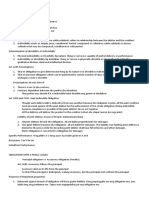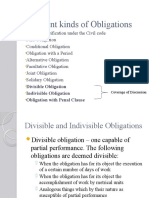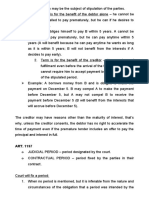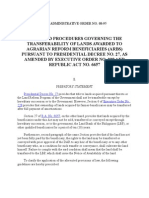BL1 1223 - 1230
BL1 1223 - 1230
Uploaded by
sweetmangoshakeCopyright:
Available Formats
BL1 1223 - 1230
BL1 1223 - 1230
Uploaded by
sweetmangoshakeCopyright
Available Formats
Share this document
Did you find this document useful?
Is this content inappropriate?
Copyright:
Available Formats
BL1 1223 - 1230
BL1 1223 - 1230
Uploaded by
sweetmangoshakeCopyright:
Available Formats
1223.
DIVISIBLE OBLIGATION - an object in which performance or delivery
is capable of partial fulfillment.
Obligation to deliver 100 sacks of rice or a particular type
INDIVISIBLE OBLIGATION object which its delivery and
performance is not capable of partial fulfillment.
Obligation to deliver a particular computer set
To determine whether it is divisible or indivisible, look at the intention
of the parties. Even though the object or service may be physically
divisible, it is indivisible if so provided by law or intended by the
parties. If the object is not physically divisible or the service is not
susceptible to partial performance, the obligation is always
indivisible, the intention of the parties to the contrary notwithstanding.
(Rule is absolute)
An obligation is presumed indivisible where the only one creditor and
only one debtor.
If a thing could be divided into parts and as divided, its value is
impaired disproportionately, that thing is INDIVISIBLE.
Kinds of Division
+ Qualitative division based on quality, not on number or quantity of
the things w/c are the object of the obligation. Ex: inheritance of heirs
+ Quantitative division based on quantity rather than on quality
Ex. Cavans of palay, 10000 cash
+Ideal or intellectual which exists in the minds of the parties
Ex. Co-ownership
Kinds of indivisibility
+ Legal indivisibility specifiygc provision of law declares as
indivisible
+ Conventional will of the parties makes a indivisible
+ Natural nature of the object or prestation does not admit of
division
1224.
JOINT INDIVISIBLE OBLIGATION the object is indivisible but the
liability of the parties is joint.
The unfulfilled undertaking (duty) is converted into a
monetary obligation which is no divisible.
The guilty debtor is liable for damages.
1225.
The following are considered INDIVISIBLE obligations:
1. Obligation to give definite things (ex: specific house)
2. Obligations which are not susceptible of partial
performance (ex: sing a song; dance)
3. Even though the object or service may be physically
divisible, it is indivisible if:
a. the law so provides (ex: taxes)
b. when the parties intended it to be indivisible (ex:
to give 1000 on a certain date)
The following obligations are deemed DIVISIBLE:
1. When the object of the obligation is the execution of a
certain number of days of work (ex: paint a house)
2. When the object of the obligation is the accomplishment of
work measured in units (make a table)
3. When the object of the obligation is susceptible of partial
compliance (ex: to teach)
4.
When the object of the obligation is such that the debtor is
required to pay in installments
--- Obligation to do and not to do are generally indivisible.
Indivisible (not to do) continuous (ex. Not sell cigarettes for a year)
Divisible (not) forbearance is not continuous (not sell on holidays)
If the contract is divisible, and a part of it is illegal, the illegal
part is void, and the rest shall be valid and enforceable.
If the contract is indivisible, and a part of it is illegal, the
entire contract is void.
Partial performance of an indivisible obligation is tantamount
to non-performance.
1226.
Principal obligation can stand by itself and does not depend for its
validity and existence upon another obligation
Accessory obligation attached to a principal obligation, cannot
stand alone
Obligation w/ a penal clause w/c contains an accessory undertaking
to pay a previously stipulated indemnity in case of breach.
PENAL CLAUSE - this is an accessory obligation attached to the
principal obligation, which imposes an additional liability in case of
breach of the principal obligation.
Purposes
- to insure performance by creating an effective deterrent against
breach. (general purpose) **reparation
- to substitute a penalty for the indemnity for damages and the
payment of interest in case of non-compliance. **punishment
^^Penal clause constitutes an obligation although accessory;
condition does not. Penal clause may become demandable in default
of the unperformed obligation and sometimes jointly with it; condition
is never demandable.
Legal penal clause provided by law
Conventional penal clause by stipulation of parties
Compensatory penal clause penal takes place of damages
Punitive penal clause imposed merely as punishment for breach
Subsidiary or alternative penal clause only the penalty can be
enforced
Joint or cumulative penal clause both the principal and penal
clause can be enforced
GR: penalty takes the place of the indemnity for damages and the
payment of interests in case of non-compliance
It pushes the debtor to perform his obligation faithfully and
without delay within the period agreed upon, or else, he
suffers a fixed civil penalty without need of proving the
damages of the other party.
The penalty imposable is a substitute for the indemnity for:
a. damages
b. payment of interest in case of breach of obligation
unless the contrary is stipulated!
EXCEPTIONS additional damages may be recovered from the
following acts:
1. If the debtor refuses to pay the penalty
2. If the debtor is guilty of fraud in the fulfillment of
the obligation
3. If there is express stipulation that the other
damages or interests are demandable to the
penalty in the penal clause
The mere non-fulfillment of the principal obligation entitles
the creditor to the extent of penalty stipulated. Creditor may
enforce the penalty whether he suffered damages or not.
The purpose of the penalty clause is precisely to avoid
proving damages.
Penalty may be enforced only when it is demandable, only if there is
a breach of the obligation and not contrary to law, etc. If the
obligation cant be fulfilled due to a fortuitous event, the penalty is not
demandable.
1227.
GR: the debtor cannot just pay the penalty instead of performing the
obligation.
If the debtor is allowed to pay the penalty this would in effect make
the obligation an alternative one.
The debtor can exempt himself from non-fulfillment of the obligation
only when this right has been expressly reserved for him.
A debtor cannot evade from payment of his principal
obligation by choosing to pay the penalty stipulated, except
when the debtor is EXPRESSLY granted with the right to
substitute the penalty for the principal obligation. an
obligation with penalty clause cannot be turned to facultative
obligation unless expressly stipulated in the contract.
GR: The creditor cannot demand the stipulated fulfillment of the
principal obligation and the penalty at the same time
1. Where there is performance once the obligation is fulfilled, there
is no need for demanding the penalty except when the creditor was
clearly given the right. GR: penal clause is subsidiary and not joint.
2. Where there is no performance the creditor may ask for the
penalty or require specific performance. Remedies are alternative,
not cumulative nor successive. If there was fraud on debtor, creditor
may recover the penalty as well as damages for non-fulfillment.
---when the creditor has demanded fulfillment of the obligation but
cannot be fulfilled due to the
a. debtors fault creditor may demand for
penalty
b. creditors fault he cannot claim the penalty
c. fortuitous event principal obligation and
penalty are extinguished
Debtor has the right to pay penalty in lieu of performance only when
this right has been expressly reserved for him.
For creditor, he has the right to demand performance and payment of
penalty jointly when this right has been clearly granted him.
1228.
As long as the agreement or contract is breached. There is
violation by the debtor.
1229.
JUDICIAL REDUCTION OF PENALTY
1. Principal obligation partly complied with by the debtor
(but not in indivisible obligation, because it is tantamount to
non-compliance)
2. Principal obligation complied not in accordance with the
tenor of the agreement
3. Penalty iniquitous or unconscionable
Judges power to reduce penalties are limited to private
contracts.
INIQUITOUS OR UNCONSCIONABLE when it is revolting to the
conscience or common sense; grossly disproportionate to the
damages suffered.
PENALTY NOT ENFORCEABLE:
1. Impossible performance of principal obligation
due to fortuitous events
2. Creditor prevented the debtor from fulfilling the
obligation
3. Penalty is contrary to good morals or good
customs
4. Both parties are guilty of breach of contract
5. Breach of contract by the creditor
6. None of the parties committed any willful or
culpable violation of the agreement
1230. The nullity of the penal clause does not carry with it that
of the principal obligation.
The nullity of the principal obligation carries with it that of the
penal clause.
Because the penal clause is only an accessory to the
principal obligation, it cannot exist alone.
If the penal clause is void, the principal obligation remains
enforceable.
You might also like
- BL1 (Law On Obligations and Contracts) - 1156-1170Document6 pagesBL1 (Law On Obligations and Contracts) - 1156-1170sweetmangoshake86% (28)
- Obligations and Contracts (Chapter 2)Document13 pagesObligations and Contracts (Chapter 2)Leesh80% (5)
- Motion For Release of Seized PropertyDocument5 pagesMotion For Release of Seized PropertyRowena Mae Mencias75% (4)
- Articles 1171-1175Document3 pagesArticles 1171-1175sweetmangoshake100% (12)
- Uber LawsuitDocument50 pagesUber LawsuitWWMTNo ratings yet
- Deed of Extrajudicial Settlement and Partition - BantogoyDocument5 pagesDeed of Extrajudicial Settlement and Partition - BantogoyRJ Banqz100% (1)
- Medical Records RequestDocument3 pagesMedical Records RequestRocketLawyer100% (4)
- Oblicon Lecture 4Document3 pagesOblicon Lecture 4Lianne JuneNo ratings yet
- Divisible and Indivisible ObligationDocument2 pagesDivisible and Indivisible ObligationJoseph AndrewsNo ratings yet
- Divisible Indivisible and Obligation With Penal ClauseDocument2 pagesDivisible Indivisible and Obligation With Penal Clauseavocado booksNo ratings yet
- Article 1223-1230Document25 pagesArticle 1223-1230viernazanne.viadoNo ratings yet
- Section 4 - Joint and Solidary ObligationsDocument2 pagesSection 4 - Joint and Solidary ObligationsJillian PizarroNo ratings yet
- ObliCon Chapter III Sections 5 6Document4 pagesObliCon Chapter III Sections 5 6Jheza May BañezNo ratings yet
- Kinds of Division : Obligations Deemed IndivisibleDocument2 pagesKinds of Division : Obligations Deemed IndivisibleFarah Tolentino NamiNo ratings yet
- Obligations and Contracts11Document5 pagesObligations and Contracts11BenjieRoqueNo ratings yet
- Indivisible and Dividible and Penal ClauseDocument13 pagesIndivisible and Dividible and Penal ClauseAmie Jane MirandaNo ratings yet
- Alternative ObligationsDocument4 pagesAlternative ObligationsMartin Benjamin Tomelden LagmayNo ratings yet
- Obligations and Contracts (Chapter 3 Sec 5)Document3 pagesObligations and Contracts (Chapter 3 Sec 5)LeeshNo ratings yet
- Oblicon - Section 5&6Document14 pagesOblicon - Section 5&6johnpaulzarzua.2022No ratings yet
- Discussion 1Document8 pagesDiscussion 1Elaisha Mae JocdongNo ratings yet
- Oblicon AssignDocument1 pageOblicon AssignJessa BasadreNo ratings yet
- Article 1226 1242 Part 1Document9 pagesArticle 1226 1242 Part 1Kristine Claire TarNo ratings yet
- Article 1227 1235Document2 pagesArticle 1227 1235JANET MARIE MERCADONo ratings yet
- Oblicon 2Document1 pageOblicon 2Cyrene CruzNo ratings yet
- Definition of ObligationDocument17 pagesDefinition of ObligationGerard Anthony Teves RosalesNo ratings yet
- OBLICON - 2nd Exam CoverageDocument34 pagesOBLICON - 2nd Exam CoverageRodrigo Reg BenitoNo ratings yet
- Oblicon DiviDocument12 pagesOblicon DiviRon BridleNo ratings yet
- Indivisible: Obligations Deemed Indivisible (Isahang Gawa)Document10 pagesIndivisible: Obligations Deemed Indivisible (Isahang Gawa)Shaina SamonteNo ratings yet
- Obligations and ContractsDocument5 pagesObligations and ContractsDiana Ong50% (2)
- Oblifuckingcon NotesDocument10 pagesOblifuckingcon NotesYfhps LnmNo ratings yet
- Divisible and Indivisible ObligationsDocument3 pagesDivisible and Indivisible ObligationsChristine Joy EstropiaNo ratings yet
- BACC2 Module9 ExtinguishmentOfObligationDocument16 pagesBACC2 Module9 ExtinguishmentOfObligationJenny AguilaNo ratings yet
- Chapter 3 Section 6Document22 pagesChapter 3 Section 6James ErsandoNo ratings yet
- Obligations and ContractsDocument7 pagesObligations and ContractsJosemari JuanicoNo ratings yet
- Write Up (1167-1170)Document4 pagesWrite Up (1167-1170)Lalaine M. TimoteoNo ratings yet
- Oblicon Module 7 (Section 6)Document5 pagesOblicon Module 7 (Section 6)Mika MolinaNo ratings yet
- Bus. LawDocument5 pagesBus. LawLhea ClomaNo ratings yet
- Supplemental Notes On Kinds of ObligationsDocument4 pagesSupplemental Notes On Kinds of ObligationsAdrian RoxasNo ratings yet
- LawDocument8 pagesLawJesley BulawanNo ratings yet
- Oblicon Art. 1223-1230Document31 pagesOblicon Art. 1223-1230Jane CANo ratings yet
- Articles 1226-1230 (Obligations With A Penal Clause)Document30 pagesArticles 1226-1230 (Obligations With A Penal Clause)DJAN IHIAZEL DELA CUADRANo ratings yet
- Joint and Solidary Liability Mini ReviewerDocument4 pagesJoint and Solidary Liability Mini ReviewerRobinson FloresNo ratings yet
- Joint and Solidary Obligations: Sec. 4 Articles 1207-1222Document32 pagesJoint and Solidary Obligations: Sec. 4 Articles 1207-1222Romulo MarquezNo ratings yet
- ART. 1197 o oDocument27 pagesART. 1197 o oAdriana Del rosarioNo ratings yet
- Oral RecitDocument3 pagesOral RecitFaviolla TangonanNo ratings yet
- Law On ObliconDocument7 pagesLaw On Oblicongale ًNo ratings yet
- OBLICON 1262 - 1422 ReviewerDocument22 pagesOBLICON 1262 - 1422 ReviewerAndrea Ang100% (6)
- Indivisibility Solidarity Concept DistinctionDocument3 pagesIndivisibility Solidarity Concept DistinctionlagurosangelicaNo ratings yet
- Nature and Effect of ObligationsDocument7 pagesNature and Effect of ObligationsVin Valerio0% (1)
- Obli 5Document7 pagesObli 5Angelo BasaNo ratings yet
- Credit FinalsDocument69 pagesCredit FinalsElaineFaloFallarcunaNo ratings yet
- Obligation-CE LAWSDocument5 pagesObligation-CE LAWSAldwin Jay MungcalNo ratings yet
- Special Contracts NotesDocument61 pagesSpecial Contracts NotesSHRAAY BHUSHANNo ratings yet
- Hukum Perikatan Macam Macam KewajibanDocument6 pagesHukum Perikatan Macam Macam KewajibannatanaelsetiawannNo ratings yet
- Premidobliconbyus PDFDocument76 pagesPremidobliconbyus PDFMaria ResperNo ratings yet
- NOTES-Obligation and ContractsDocument8 pagesNOTES-Obligation and ContractsReveJoyNo ratings yet
- Mancomunadamente, Pro Rata,: Effects of Payment by Solidary CreditorsDocument4 pagesMancomunadamente, Pro Rata,: Effects of Payment by Solidary Creditorsmichean mabaoNo ratings yet
- Lecture - Kinds of Obligations - in - Divisible Obligations and Obligations With PenaltiesDocument3 pagesLecture - Kinds of Obligations - in - Divisible Obligations and Obligations With PenaltiesMickaela Delos SantosNo ratings yet
- Notes For FinalDocument8 pagesNotes For FinalJune CostalesNo ratings yet
- Module 4 - Divisible and Indivisible Obligations, Obligations With A Penal ClauseDocument23 pagesModule 4 - Divisible and Indivisible Obligations, Obligations With A Penal ClauseArjane SamaniegoNo ratings yet
- Oblicon Final Exam ReviewerDocument24 pagesOblicon Final Exam ReviewerJustine L. BotillaNo ratings yet
- Life, Accident and Health Insurance in the United StatesFrom EverandLife, Accident and Health Insurance in the United StatesRating: 5 out of 5 stars5/5 (1)
- Understanding Named, Automatic and Additional Insureds in the CGL PolicyFrom EverandUnderstanding Named, Automatic and Additional Insureds in the CGL PolicyNo ratings yet
- BL 3 Chapter 8 14Document8 pagesBL 3 Chapter 8 14sweetmangoshakeNo ratings yet
- BL1 1223 - 1230Document2 pagesBL1 1223 - 1230sweetmangoshakeNo ratings yet
- Kinney CH 02Document19 pagesKinney CH 02sweetmangoshakeNo ratings yet
- Children at Risk and Conflict With Law RevisedDocument12 pagesChildren at Risk and Conflict With Law RevisedPatrice Alexandra DeVeraNo ratings yet
- Death PenaltyDocument7 pagesDeath Penaltyermeline tampusNo ratings yet
- Transferability of Lands Awarded To ArbsDocument5 pagesTransferability of Lands Awarded To ArbsanneNo ratings yet
- Bangladesh Vs Noor ChowdhuryDocument13 pagesBangladesh Vs Noor ChowdhuryPalash Chandra SarkarNo ratings yet
- Position Paper That Disagree On Death PenaltyDocument2 pagesPosition Paper That Disagree On Death PenaltyLokk Sparia80% (5)
- Compulsory WindingDocument6 pagesCompulsory WindingAimi AzemiNo ratings yet
- New Microsoft Word DocumentDocument2 pagesNew Microsoft Word DocumentblossomNo ratings yet
- F.H. Stevens v. NordeutscherDocument1 pageF.H. Stevens v. Nordeutscherrgtan3No ratings yet
- People v. FelanDocument5 pagesPeople v. FelanAria TomyNo ratings yet
- Sale of Goods and Partnership Act (Contract II)Document172 pagesSale of Goods and Partnership Act (Contract II)holly latonNo ratings yet
- A. Preparatory Policitation: Gabelo V Ca FactsDocument22 pagesA. Preparatory Policitation: Gabelo V Ca FactsSam MaulanaNo ratings yet
- Arumugam So Muthusamy V Public Prosecutor - 1Document7 pagesArumugam So Muthusamy V Public Prosecutor - 1Malar Subramaniam100% (1)
- Hindu Marriage Act: Bigamy: Void & PunishableDocument12 pagesHindu Marriage Act: Bigamy: Void & PunishableTanya KatariaNo ratings yet
- Municipal Council of Lemery Batangas vs. Provincial Board of BatangasDocument2 pagesMunicipal Council of Lemery Batangas vs. Provincial Board of BatangasSharmen Dizon GalleneroNo ratings yet
- In Re Speedy Disposition of CasesDocument63 pagesIn Re Speedy Disposition of CasesPatrick StarfishNo ratings yet
- Manotoc Vs CADocument1 pageManotoc Vs CAGheeness Gerald Macadangdang MacaraigNo ratings yet
- Justice Emily Civil Law Chairs Cases 2022 J CaguioaDocument278 pagesJustice Emily Civil Law Chairs Cases 2022 J CaguioaRoadSafety SuppliersNo ratings yet
- Amway Direct Retailer/Seller Application: Personal DetailsDocument4 pagesAmway Direct Retailer/Seller Application: Personal DetailsDeep GaurNo ratings yet
- Timeshare Lies & Broken PromisesDocument3 pagesTimeshare Lies & Broken PromisesGary Smith100% (1)
- Pacific Rehouse Corp v. Eib Securities Inc (Digest)Document2 pagesPacific Rehouse Corp v. Eib Securities Inc (Digest)Dong Onyong100% (1)
- Martin Trowery v. William Perrill, Warden, Also Known As Bill Perrill, Fci Englewood, Colorado K.W. Hawk, Director, Federal Bureau of Prisons, 25 F.3d 1058, 10th Cir. (1994)Document2 pagesMartin Trowery v. William Perrill, Warden, Also Known As Bill Perrill, Fci Englewood, Colorado K.W. Hawk, Director, Federal Bureau of Prisons, 25 F.3d 1058, 10th Cir. (1994)Scribd Government DocsNo ratings yet
- Real Prop Law Ques and AnsDocument62 pagesReal Prop Law Ques and AnstennesseeramnarinesinghNo ratings yet
- Law On Sales QUIZZERDocument2 pagesLaw On Sales QUIZZERKatelyn Cosico100% (3)
- Modes of Charging SecuritiesDocument11 pagesModes of Charging SecuritiesKopal Agarwal50% (4)
- TDA V TCZ (2016) SGHC 63Document18 pagesTDA V TCZ (2016) SGHC 63slowkittyNo ratings yet
- Duran V IacDocument1 pageDuran V IacDonia SxupladitahNo ratings yet






























































































